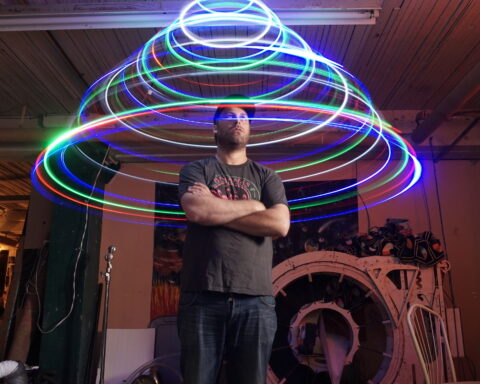Les Salopes or the Naturally Wanton Pleasure of Skin
(Canada, 97 min.)
Written and directed by Renée Beaulieu
Starring: Brigitte Poupart, Nathalie Cavezzali, Vincent Leclerc, Pierre Kwenders, Romane Denis
Programme: Contemporary World Cinema (World Premiere)
News flash: your mom has a sex life!
Renée Beaulieu gives praise to older women in the frank and sweaty drama Les Salopes or the Naturally Wanton Pleasure of Skin. “Salopes” literally means “sluts,” but the connotation seems twice as vulgar when one translates the word from French to English, so the Franglais title of the film has merit. Salopes is a rich and layered drama that unabashedly celebrates women’s sexuality. Beaulieu favours natural bodies that jiggle and show their age, rather than display for male pleasure the runway-ready figures that dominate sex scenes in both porn and mainstream films. There’s a frankness and a raw carnality to Les Salopes that is too rare in cinema.
The film stars Brigitte Poupart as Marie-Claire, a dermatological researcher who specializes in the science of human desire. (POV readers might know Poupart as the director of the powerful 2012 documentary Over My Dead Body, which won her Quebec’s Jutra Award.) Marie-Claire’s research is hands-on to an unorthodox degree as she scrapes samples of dead skin cells from her forearms—and her partners’ forearms—both pre- and post-coitus. She puts under the microscope the biological sensations that escape through the pores during moments of hot sexual intimacy. Marie-Claire, ever the meticulous researcher, ensures that her experiment draws from a robust and diverse pool of samples. She swaps skin and bodily fluids with a co-worker, a student, an old friend, her veterinarian, and the guy across the street. Sexual agency is at the forefront of Marie-Claire’s research and her intellectualized nymphomania lets Beaulieu explore the pleasures of intimate contact.
Poupart gives a bold and fearless performance as Marie Claire. The actress starred in last year’s Best Canadian Feature at TIFF Les affamés and proved far fiercer than the array of brain-hungry zombies with her scene-stealing performance as a machete-wielding working mother, but her turn as Marie-Claire is full-blooded and ravenous. She owns Marie-Claire’s sexual appetite without a hint of self-consciousness. Her trust in Beaulieu as a director invites the camera to caress every curve of her body. Salopes embraces the tactile pleasures of skin—the body’s most sensuous organ as Marie-Claire notes in voiceover.
Marie-Claire’s confidence in her sexuality, however, proves to film’s central conflict as her peers struggle to be as progressively minded as she is. Her friend Mathilde (Nathalie Cavezzali), a chattering alcoholic, grapples with her own childlessness at age 45. Mathilde is jealous that Marie-Claire seems to have it all and she regales Marie-Claire with loose-lipped recollections of her sexual escapades that seek to fill the void of her unhappiness. Similarly, Marie-Claire’s husband, Adam (Vincent Leclerc), finds himself shell-shocked when he discovers that his wife’s definition of their “no questions asked” relationship is much more liberal than his own. Les Salopes seeks the fine line between being promiscuous and polyamorous, or of the possibility to detach sexual intimacy from emotional bonds like love and desire.
The film’s inquiry into women’s agency inevitably leads Marie-Claire into #MeToo territory when a colleague (and “research subject”) is accused of sexually assaulting a student in the department. Marie-Claire finds herself in the crosshairs of morality and mob-mentality as she avoids taking sides and instead takes an academic approach to the situation by proposing that everyone see beyond the predator/victim binaries that have oppressed women for far too long. Her desire for neutrality is but another layer in the film’s multifaceted study of the changing attitudes towards agency and consent circa 2018 as the film asks the degree to which Marie-Claire can advocate for women to have ownership of their sexuality without stripping them of their authority. Les Salopes a penetrating character study that refreshingly flips the cinematic gaze through feminine perspectives.










